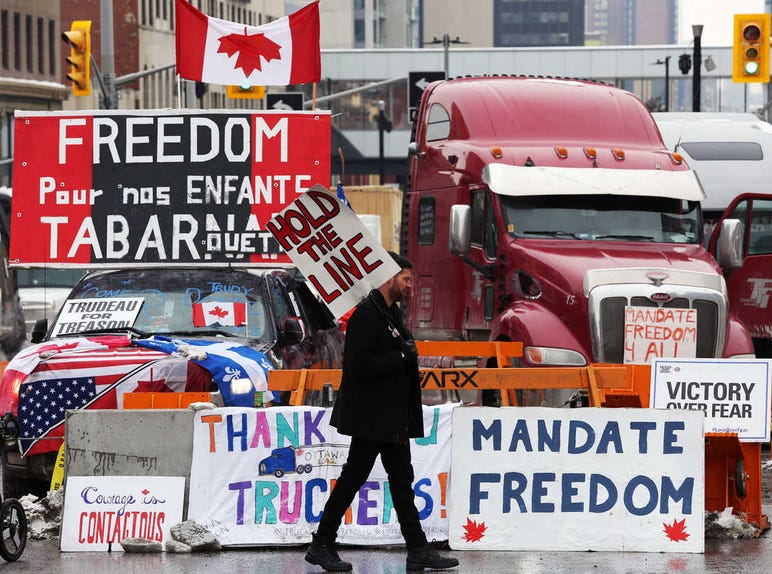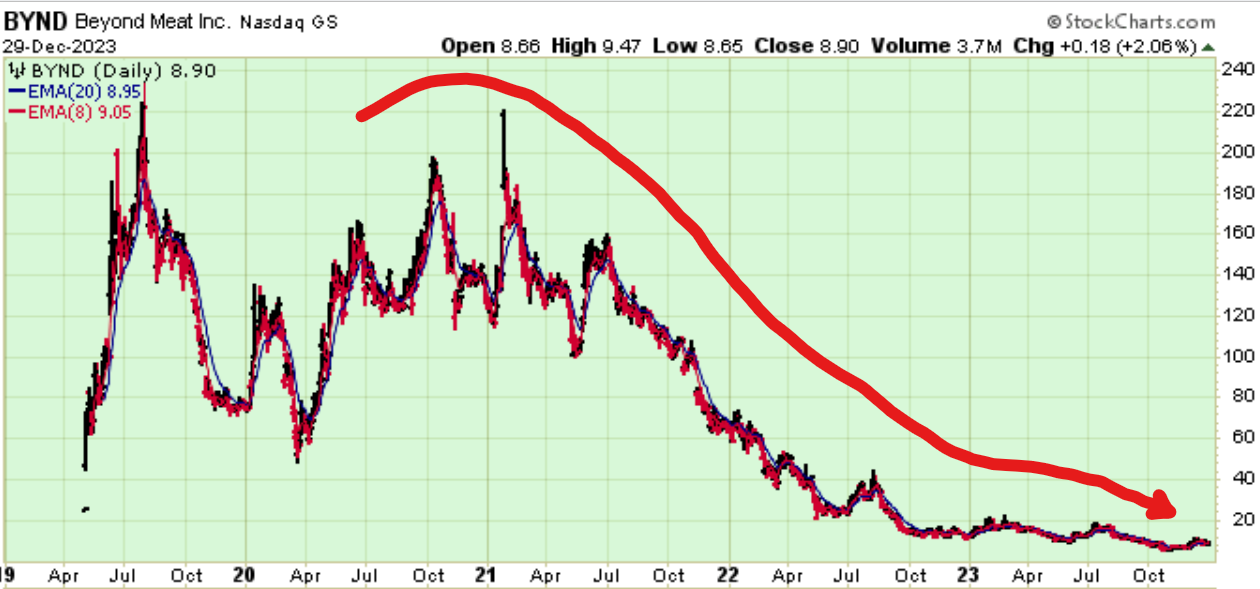BOOM Finance and Economics 7th January 2024 -- a Global Review
WEEKLY -- On Sunday -- All previous Editorials are available at LinkedIn and at Wordpress https://boomfinanceandeconomics.wordpress.com/
BANKERS HATE CASH
THE SUPPLY OF CASH IS DETERMINED BY ITS DEMAND
BO LI (THE IMF) WARNS THE WORLD -- CBDC’s CAN BE PROGRAMMED TO REWARD OR PUNISH – YOU HAVE BEEN WARNED
PHYSICAL CASH IS A VOTING MACHINE THAT CAN BE USED EVERY DAY
BEYOND MEAT – THE NEW WORLD ORDER DIET – BLAME DAVOS
KABOOM – HAS BOOM DESTROYED THE ELECTRIC CAR INDUSTRY?
ELECTRIC VEHICLE DEMAND CRUMBLING IN THE USA
BANKERS HATE CASH
Bankers hate physical cash. Physical cash costs them money and profits. They are expected to collect it, secure it, account for it, distribute it and manage the recall of old cash notes and coins. Then they have to return those to the federal mint or the central bank. All of this activity generates no revenue for the commercial banking sector. Thus, it generates no profits. In fact, it is worse than that. It is a cost centre for the entire banking sector. So it’s not hard to understand that physical cash is the bankers enemy.
Ajay Banga has described physical cash as “public enemy number one”. The public don’t see Cash as an enemy. So why would he say that? That question can be answered by looking at who he is and his background.
Banga is an Indian by birth and now a US citizen since 2007. He is now the President of the World Bank after being nominated by Joe Biden for the position. He has worked previously for the giant American banking group Citibank and he is a former Chairman and CEO of Mastercard, the global credit card company. He has given many reasons for eliminating cash from an economy explaining why he sees it as “public enemy number one”. Not surprisingly, Mastercard’s “vision” for the future has been described as a “World Beyond Cash”.
BOOM doubts if you will ever see him (or any other banker) discussing the benefits of physical cash. But there are many. Let’s look at the list of benefits of cash.
Cash is sovereign money
Cash is the peoples money
Cash is non-interest bearing at origination
Cash is fungible
Cash is non-electronic
Cash does not require electricity or electrical devices
Cash is anonymous
Cash supply is immediately responsive to increased demand from the people
Cash provides an excellent buffer against excess creation of interest bearing credit money
(credit money is created as a bank loan and therefore is mostly collateralised against existing assets which re-enforces the Cantillion Effect).
The Cantillion Effect was described way back in 1755 by Richard Cantillion in Ireland (it was published long after his death, by the way). His observation on money supply is historic and one of great clarity. He described how some members of society benefit more from being closest to the origination of fresh new money. In other words, if most fresh new money is created as a bank loan, then that will favour the rich and powerful (who own assets that can be used as collateral) over the poor and the weak. It will, of course, allow those people to purchase yet more assets and thus this effect gives rise to asset price inflation – which is a subject almost never mentioned by economists, bankers or politicians. Presumably they prefer to keep it a secret.
Importantly, in most advanced economies of the world, the supply of fresh new money created as a bank loan is now around 97 – 98 % of the total. Thus, cash is only 2 – 3 % of the supply of fresh new money. The “buffering” effect of cash to dampen excess credit creation has declined dramatically since the 1960’s when the ratio of credit money to cash in the money supply was much more favourable to physical cash.
THE SUPPLY OF CASH IS DETERMINED BY ITS DEMAND
But perhaps the most important aspect of physical cash is that its supply is determined by its demand. In other words, if the People use more of it in their transactions, then the supply has to be increased. In effect, this takes the power of increasing the money supply away from the bankers and transfers it to the people.
If the Sovereign does not increase the supply of cash in response to demand, then the consequences can be potentially catastrophic (for the sovereign). Historical records tell us what has happened in the past and thus, what is most likely to happen in the future. The people will revolt and soon depose the Head of State or the politician who runs the federal government. In history, if they were lucky, they escaped with their heads intact and their lives. If they were not so lucky, readers can guess what happened.
CASH INCREASING IN MANY NATIONS SIMULTANEOUSLY
Increased use of cash is not just occurring in the UK. There are firm reports of this also occurring in Switzerland, Spain, Germany, Nigeria, Slovakia, Austria and India. Austria and Slovakia have enshrined the use of cash in their national Constitutions which enraged the European Commission whose head is the un-elected Ursula von der Leyen. Regular readers of BOOM will not be surprised to learn that the European Commission, the top body in the European Union, wants to destroy cash.
In the UK, the Post Office has been offering intermediary cash services for banks in recent years. Since the summer of 2022, there has been a sustained increase in the amount of cash being deposited and withdrawn at its branches. In November this year, personal cash withdrawals across the UK Post Office’s 11,500 branches totalled £878 million, the highest amount on record.
BO LI (THE IMF) WARNS THE WORLD -- CBDC’s CAN BE PROGRAMMED TO REWARD OR PUNISH – YOU HAVE BEEN WARNED
Who is Bo Li ? And what did he say about Central Bank Digital Currencies (CBDCs)?
Bo Li has been Deputy Managing Director at the IMF (International Monetary Fund) since August 2021. He is responsible for the IMF’s work in about 90 countries as well as on a wide range of policy issues. Before joining the IMF, he worked for many years at the People’s Bank of China (China’s central bank), rising to the role of Deputy Governor. He earlier headed the Monetary Policy, Monetary Policy II, and Legal and Regulation Departments, where he played an important role in the reform of state-owned banks, the drafting of China’s anti-money-laundering law, the internationalisation of the Chinese currency, the Yuan, and the establishment of China’s macroprudential policy framework.
On the 15th October 2022, at a conference organised by the IMF, titled “Central Bank Digital Currencies for Financial Inclusion”. Mr Bo Li made the following statements --
“CBDC’s can improve financial inclusion through what we call … program-ability. CBDC’s can allow government agencies and private sector players to program, to create smart contracts, to allow targeted policy functions. For example, welfare payments, consumption coupons, food stamps. By programming CBDC’s, those moneys can be precisely targeted for what kind of people can own and what kind of use this money can be utilised, for example for food. So this potential program-ability can help government agencies to precisely target their support to those people who need support”.
It all sounds “For the Greater Good”. It implies the best of intentions.
But its message is chillingly LOUD and CLEAR.
“We can cut your access to food if we wish. Do as we say or else.”
Source: https://twitter.com/i/status/1682002080238583808
PHYSICAL CASH IS A VOTING MACHINE THAT CAN BE USED EVERY DAY – THE CASH REVOLUTION HAS BEGUN
BOOM has vigorously supported the increased use of physical cash in many editorials over the last few years. The campaign now seems to be getting through to people all over the planet. Your wallet can be used as a voting machine each and every day especially if the use of physical cash is increased. That sends a very powerful message to bankers and governments who appear to be conspiring to remove cash from circulation. BOOM asks readers to question why this is being done.
Let’s consider what has happened over the last 3 years.
We now know that the so-called Covid “Pandemic” was definitely not a pandemic of excess death from a deadly virus. It was more a pandemic of exaggerated fear and totalitarian control created by powerful global institutions including pharmaceutical companies, the un-elected so-called World Health Organisation, the un-elected World Economic Forum (WEF), the un-elected Bill Gates, numerous politicians/governments and the mainstream media. As a result, people have lost faith in those institutions. And the recent disastrous money experiments in India and Nigeria have contributed to a further loss of trust in financial institutions, central banks and governments.
BOOM described the Nigerian disaster in the editorial of 8th October 2023. It was titled “CENTRAL BANK DIGITAL CURRENCIES CANNOT SUCCEED – THEY ARE INTELLECTUALLY BANKRUPT -- THE DISASTROUS FAILURE OF NIGERIA’S CENTRAL BANK DIGITAL CURRENCY”
Nigeria jailed the head of the central bank after that fiasco. As far as BOOM is aware, he is still in jail.
So how and why are people using cash in reaction to these developments?
UK Finance is a lobbying group for the banks in the United Kingdom. It describes itself as “the collective voice for the banking and finance industry. Representing more than 300 firms across the industry”. In September 2023, they released a report on payment trends in the UK, showing that cash payments had increased in 2022, for the first time in a decade.
The report showed that the number of cash payments had risen by 7% in 2022 from 2021. It attributed this to CPI inflation which had (somehow) “prompted many people to turn back to cash or use it more often than before to help them manage their budgets”.
Another report released in December by the British Retail Consortium showed the findings of its annual payments survey. In agreement with UK Finance, this survey also found that cash use had increased in 2022 to almost 20 % of transactions.
The Daily Telegraph newspaper wrote an article on the payments survey.
Quote:
“Coins and banknotes accounted for nearly a fifth of transactions in 2022, according to the British Retail Consortium (BRC)’s annual Payments Survey.
Its report said: “This year’s Payments Survey shows an increase in cash usage for the first time in a decade, up from 15% (in 2021) to just under 19% of transactions (in 2022).
“Faced with rising living costs, cash was a useful tool for some people to manage their finances and track their day-to-day spending.”
Again, the explanation was the same, saying that (somehow) the people needed to use cash as a “useful tool” in order to “manage their finances”.
However, BOOM does not agree. This is not about inflation and better management of finances. It is about Loss of Trust. 19% of transactions is a large number. And that was the first such increase noted since 2013.
Something big is happening in the way that people perceive cash and its importance. Distrust of the financial institutions, the central banks and governments is the most probable cause.
In another recent editorial on 10th December, BOOM showed that the people of Canada have lost almost all trust in their most senior institutions.
BOOM wrote -- Quote: “The recent poll commissioned by the Bank of Canada (the central bank) and referenced in a report titled “Digital Canadian Dollar Public Consultation Report”, dated November 2023. The survey received a high level of engagement from individuals across Canada, gathering a total of 89,423 responses.
Quote: “In the category dealing with “Complete Trust”, only 4 % of Canadians have complete trust in their financial institutions, 5 % in the central Bank of Canada, 3 % in the Government and only 1 % in major Technology companies.
But the shock is contained in the category “Completely Distrust”. Here, 74 % of the respondents completely distrust the Government of Canada, 58 % completely distrust the Bank of Canada, 46 % distrust their financial institutions and 61 % completely distrust the major Technology companies.”
The numbers are staggering. BOOM strongly suspects that people are moving to physical cash because they can, because it is a protest movement and because it is a way to remove themselves from the oversight of those powerful institutions that have betrayed their trust.
LOSS OF TRUST
The farmers of Germany, France and The Netherlands have also lost trust in their governments and are at the forefront of this massive change. They are strongly supported by the truckers of Canada. Without farmers and truckers, the economies will grind to a halt. The Cash Revolution has begun.
GERMAN FARMERS
FRENCH FARMERS
INDIAN FARMERS
CANADIAN TRUCKERS
BEYOND MEAT – THE NEW WORLD ORDER DIET
Yet another crazy, stupid and outright dumb idea driven by the un-elected World Economic Forum (WEF) in Davos Switzerland and its un-elected allies in the United Nations organisations such as the World Health Organisation, UNESCO and the World Food Program is the plan to replace animal products with plant based food fakes and insects.
“You will eat zee bugs and you vill like them”.
“You will own nothing and you vill be happy”.
This is, of course, “for the greater good”, “to save the planet” and to “improve health outcomes”. Politicians, the mainstream media and government agencies have, of course, jumped on board, presumably bribed, blackmailed or coerced in some way to do so.
Beyond Meat is a US company that was founded in 2009. They proudly state their mission as “By shifting from animal to plant-based meat, we can positively affect the planet, the environment, the climate and even ourselves.” Sounds promising? Virtue signalling to the Max?
In 2009, its mission was simply to combat climate change but they seem to have given up on that slogan, promising to only “affect” the climate positively (maybe that means to make it warmer?).
Over the years from 2013 to 2016, as reported by Wikipedia, the company received venture capital funding from Great Point Ventures, Kleiner Perkins, Obvious Corporation, Bill Gates (of course), the Humane Society and Tyson Foods. Tyson Foods sold its 6.5% stake and exited the investment in April 2019, ahead of the company's initial public offering. Smart move, Tyson.
The share price of Beyond Meat began life with a great deal of investor enthusiasm. Its share price reached almost $ 235 on 22nd July 2019 ($ 234.90 to be precise). However, investors have since lost faith in the company and its shares are now wallowing around $ 8.00. That is a fall of 96 %.
True believers who wish to save the planet are required here to support the company as investors. The share price chart shows the last 5 years of progress.
In recent editorials, BOOM has shown how investors have similarly abandoned renewable energy companies, electric car companies (except Tesla) and hydrogen energy companies over the last 3 years. None of these technologies appear to be commercially viable. That is BOOM’s conclusion from witnessing the speed with which investors have sold out.
Beyond Meat’s Revenues from 2020 to 2022 stalled around $ 410 Million per annum. Its costs rose from $ 284 Million in 2020 to $ 442 Million in 2022. Its Pre Tax Losses rose from $ 52 Million in 2020, to $ 179 Million in 2021 and then to a staggering $ 347 Million in 2022.
On November 8th, 2023, the company released its financial results for the third quarter.
Net revenues for the quarter were $75.3 million, a decrease of 8.7% year-over-year. Gross profit was a loss of $7.3 million. Net loss was $70.5 million, compared to a net loss of $101.7 million, in the last annual period.
Net revenues (for 2023) are now expected to (hopefully) be in the range of $330 million to $340 million, representing a decrease of approximately 21% to 19% compared to 2022.
From the company’s Press Release --
Gross profit for the full year, including the positive impact of the Company’s change in accounting estimates for the useful lives of its large manufacturing equipment implemented in the first quarter of 2023, is now expected to be approximately breakeven.
The Company continues to expect operating expenses to be approximately $245 million or less, before one-time separation costs and potential savings associated with the Company’s recent reduction in force.
On November 2nd 2023, the Company announced a reduction-in-force affecting approximately 65 employees -- approximately 8% of the Company’s total global workforce and approximately 19% of the Company’s global non-production workforce
KABOOM – HAS BOOM DESTROYED THE ELECTRIC CAR INDUSTRY?
By the way, Ford has recently announced a huge cut in electric vehicle (EV) production. It is losing $ 36,000 on each EV vehicle sold and there are reports that around 50 % of its dealers have refused to take any EV cars in 2023. Its unsold EV inventory is 92,000 cars.
EV DEMAND CRUMBLING IN THE USA — TIME TO WRITE TO THE PRESIDENT
Over 4,000 car dealers representing all the major vehicle manufacturing brands and 50 States in the United States just wrote to the President.
A Letter to the President of the United States from 4,000 Car Dealerships
Dear Mr. President,
We are auto dealers from across the country who collectively sell every major brand in the U.S. We are small businesses employing thousands of Americans. We are deeply committed to the customers we serve and the communities where we operate, which is why we are asking you to slow down your proposed regulations mandating battery electric vehicle (BEV) production and distribution.
Your Administration has proposed regulations that would essentially mandate a dramatic shift to battery electric vehicles (BEVs), increasing year after year until 2032, when two out of every three vehicles sold in America would have to be battery electric.
Currently, there are many excellent battery electric vehicles available for consumers to purchase. These vehicles are ideal for many people, and we believe their appeal will grow over time. The reality, however, is that electric vehicle demand today is not keeping up with the large influx of BEVs arriving at our dealerships prompted by the current regulations. BEVs are stacking up on our lots.
Last year, there was a lot of hope and hype about EVs. Early adopters formed an initial line and were ready to buy these vehicles as soon as we had them to sell. But that enthusiasm has stalled. Today, the supply of unsold BEVs is surging, as they are not selling nearly as fast as they are arriving at our dealerships -- even with deep price cuts, manufacturer incentives, and generous government incentives.
While the goals of the regulations are admirable, they require consumer acceptance to become a reality. With each passing day, it becomes more apparent that this attempted electric vehicle mandate is unrealistic based on current and forecasted customer demand. Already, electric vehicles are stacking up on our lots which is our best indicator of customer demand in the marketplace.
Mr. President, no government agency, no think tank, and no polling firm knows more about the automobile customer than us. We talk to customers every day. As retail automotive dealerships, we are agnostic as to what we sell. Our business is to provide customers with vehicles that meet the needs of their budgets and lifestyles.
Some customers are in the market for electric vehicles, and we are thrilled to sell them. But the majority of customers are simply not ready to make the change. They are concerned about BEVs being unaffordable. Many do not have garages for home charging or easy access to public charging stations. Customers are also concerned about the loss of driving range in cold or hot weather. Some have long daily commutes and don’t have the extra time to charge the battery. Truck buyers are especially put off by the dramatic loss of range when towing. Today’s current technology is not adequate to support the needs of the majority of our consumers.
Many of these challenges can and will be addressed by our manufacturers, but many of these challenges are outside of their control. Reliable charging networks, electric grid stability, sourcing of materials, and many other issues need time to resolve. And finally, many people just want to make their own choice about what vehicle is right for them.
Mr. President, it is time to tap the brakes on the unrealistic government electric vehicle mandate. Allow time for the battery technology to advance. Allow time to make BEVs more affordable. Allow time to develop domestic sources for the minerals to make batteries. Allow time for the charging infrastructure to be built and prove reliable. And most of all, allow time for the American consumer to get comfortable with the technology and make the choice to buy an electric vehicle.
Sincerely,
Supporting Dealership
The letter and the full list of 4,468 Dealership signatories is available at the website EV Voice of the Customer
https://evvoiceofthecustomer.com/
In economics (and finance), things work until they don’t. Do your own research. Make your own conclusions. BOOM does not offer investment advice.
Disclaimer: All content is presented for educational and/or entertainment purposes only. Under no circumstances should it be mistaken for professional investment advice, nor is it at all intended to be taken as such. The commentary and other contents simply reflect the opinion of the authors alone on the current and future status of the markets and various economies. It is subject to error and change without notice. The presence of a link to a website does not indicate approval or endorsement of that web site or any services, products, or opinions that may be offered by them.
Neither the information nor any opinion expressed constitutes a solicitation to buy or sell any securities nor investments. Do NOT ever purchase any security or investment without doing your own and sufficient research. Neither BOOM Finance and Economics.com nor any of its principals or contributors are under any obligation to update or keep current the information contained herein. The principals and related parties may at times have positions in the securities or investments referred to and may make purchases or sales of these securities and investments while this site is live. The analysis contained is based on both technical and fundamental research.
Although the information contained is derived from sources which are believed to be reliable, they cannot be guaranteed.
Disclosure: We accept no advertising or compensation, and have no material connection to any products, brands, topics or companies mentioned anywhere on the site.
Fair Use Notice: This site contains copyrighted material the use of which has not always been specifically authorized by the copyright owner. We are making such material available in our efforts to advance understanding of issues of economic and social significance. We believe this constitutes a ‘fair use’ of any such copyrighted material as provided for in section 107 of the US Copyright Law. In accordance with Title 17 U.S.C. Section 107, the material on this site is distributed without profit. If you wish to use copyrighted material from this site for purposes of your own that go beyond ‘fair use’, you must obtain permission from the copyright owner.













